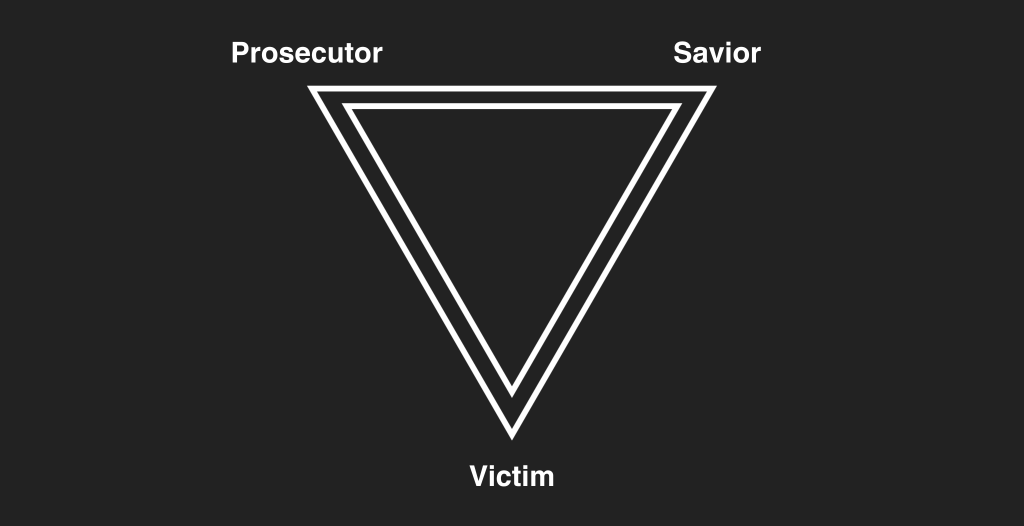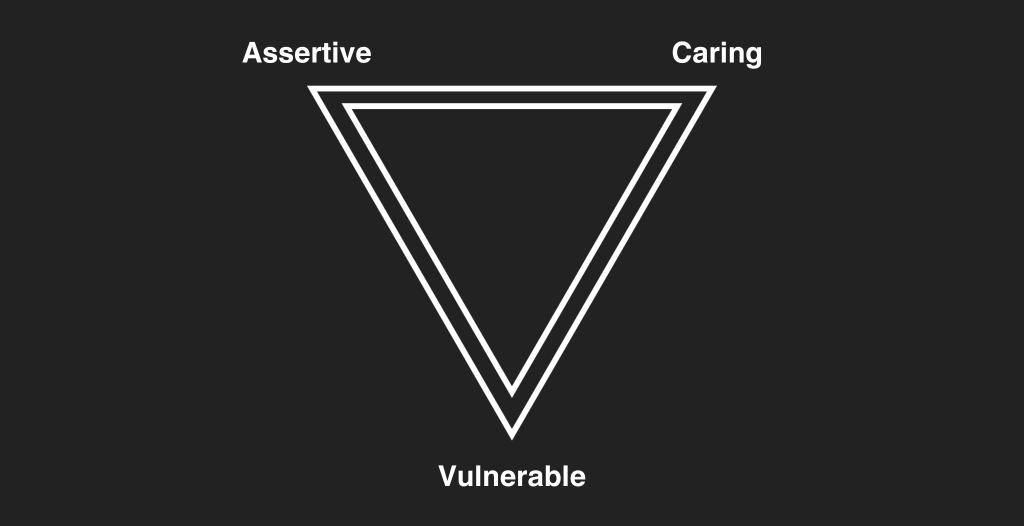Ever wondered why many of your relationship strands, be they professional or personal, always feel like a chore? One of the keys to understanding long-term relationships can be found in a helpful tool used in transactional analysis and NLP (neuron-linguistic programming).
In this article, I want to explain what a drama triangle is, and how you could move into a victory triangle.
The Drama Triangle
The drama triangle consists of, you guessed it, a triangle with 3 roles that people often move in. It was first coined in 1968 by Karpman and then became a widely used tool for psychoanalytics.

Two sides of the triangle are up, consisting of roles that often ‘feel better’ than the role that is downwards, which may not imply they are actually doing better.
All of the three roles involve misrecognition, ignoring who someone actually is. In a role, you are not acting from the position of who you really are, but usually from old habits, ill-formed patterns and other mechanisms usually formed in childhood.
Often, people automatically play one of the three roles and even can be in other roles depending on the relationship or context. This is especially the case if people (unconsciously) keep something hidden from each other in a relationship.
The savior
For the savior, other people are inferior and need to be helped from the ‘higher position’ of the savior. For a savior, other people’s needs are most important.
Typical characteristics of a savior are being helpful, being efficient, having difficulty saying no, having a hard time caring for one’s own needs, and always fixing things for others.
You may think that all these characteristics sound rather positive, but in the process, the savior is destroying oneself ignoring their own needs, and making others dependent on him or her. This dependency also means that others will never be able to solve their own problems, so in the end they are not helped after all.
The core emotion of the savior is guilt.
The prosecutor
The prosecutor is someone who belittles and takes down people. Other people are, according to the prosecutor, inferior too. The prosecutor only listens to their own needs, and is therefore autonomous, but also needs others to believe they are autonomous.
Typical characteristics for a prosecutor are being judgemental, critical, compelling, actively and passively aggressive, using violence and cursing – and oddly enough, being silent for days.
The core emotion for the prosecutor is anger.
The victim
The core emotion for the victim is sadness, feeling like a victim of circumstances or their own behavior. The victim is not able to formulate his needs, or make requests. They often transfer their problems to the rescuer (or savior). The victim is, therefore, not autonomous.
The sad thing is that the roles in a triangle often strengthen each other’s behavior, meaning that roles need and depend on each other. The consequence is that both persons are clogged down into a negative cycle.
Overcoming Drama: The Victory Triangle
The opposite, or the position we want to be in is called the Victory Triangle, introduced by Acey Choy. While strictly not the true opposite of the Drama Triangle, it gives a glimpse into what healthy relationships can look like. The 3 characteristics denote how each of the roles could be turned into a positive characteristic.

The following three characteristics are essential to grow into the victory triangle.
1. Assertive
The core of being assertive is taking into account both your own interests and someone else’s.
Some characteristics are:
- Asking for what you need
- Thanking for what you don’t want
- Daring and being able to say no
- Able to receive and give feedback
- Able to implement changes (in oneself)exit your role
Some of the typical traits associated with being assertive is saying what you are thinking and feeling, without hurting anyone else.
2. Caring
The core of caring is caring for yourself and others.
Some characteristics are:
- Thinking for oneself, not for others
- Not taking work off the hands of others without being asked
- Doing what is needed (and not more!)
- Doing things you want to, not things you don’t want to.
- Being able to see what someone really needs, without stretching your own boundaries.
Typically, if you are caring you are able to listen well but oddly enough care is driven by a healthy amount of self-esteem.
3. Vulnerable
Being vulnerable is about acknowledging that you have needs.
Some typical characteristics are:
- Being able to be open and vulnerable
- Being able to solve position from an adult ego-position.
- Being aware of one’s own feelings and thoughts and taking these seriously.
Usually, being vulnerable means you are able to solve problems from the consciousness of who you are, but more importantly, gently inviting others to help solve your problems.
Another addition to the victory triangle is the 3c triangle, consisting of the creator, challenger, and coach:
- Victims become creators by becoming responsible for overcoming their own life challenges.
- Prosecutors become challengers, in the sense that they change others to clarify their needs.
- Saviors become coaches, and they will ask other questions to make informed choices of their own (stressing the importance of their own – people are responsible for their own problems).
Practical Tips for Overcoming Drama
So how can I overcome drama in practice? Here are some takeaways:
- Be aware or conscious of your (possible) role in the drama triangle, and exit your role.
- Remain open in your relationships, tell everything, and don’t keep secrets. In short, speak the truth.
- Be aware of and indicate your boundaries.
- Train yourself in the characteristics of the victory triangle.
- Try to regain your joy, and be in the surroundings of loving and stable people. Cut connections with toxic and unhealthy relationships if people are not willing to change these relations.
A key exercise in being aware of the drama triangle is to gather a group of three friends or relations, and purposely take a role each and see how this acts out in real-life situations. Being conscious of your role in the drama triangle is the first, but most important, step in tackling it.
In the end, being kind to oneself, but very strict to one’s boundaries remains key here.
Another important method for overcoming the drama triangle is to be aware of the deeper needs that every role reflects. Let’s view a few examples for each role:
- The prosecutors, in their search for recognition, have deeper needs for communion, harmony, and being in contact.
- The victims may have deeper needs for belonging, autonomy, and identity.
- And the saviors may have deeper needs for contribution, responsibility, and support.
Obviously, all involved parties should be committed to getting out of the Drama Triangle, but sometimes this may be hard because of hard-learned patterns or addictive behavior. A lot of our behaviors are developed in early childhood, stressing the importance of receiving love from a young age.
The good news is that though patterns may be stubborn, it is always possible to return to healthy patterns, leading to a life of joy. The interesting thing is that healthy relationships and connections bring us joy, and joy is related to an area in the brain that always can remain developing.
Having said that, how do I position myself in healthy relationships? Let’s take a look at one perspective.
A Healthy Position: I am Okay, and You Too.
A lot of the dynamics in the Drama Triangle could be caused by a damaged self-image or self-position. A healthy position states: ‘I am okay’, while an unhealthy self-position states the obvious: “I am not okay”, or even ‘You’re not okay’. We can simply summarize it in the following quadrant:
you are
In the quadrant, we basically find four basic positions:
- I am not okay, and you aren’t either: life is meaningless and desperate, and rejection is forming a big part of the life story for someone in this position. Someone considers oneself unloved and is also not expecting love from others.
- I am not okay, but you are okay: life is depressing, and being a victim is a common life story. The focus is losing and being a victim of others (or circumstances).
- I am okay, but you are not okay: life is viewed from a paranoid or arrogant position. One may seem a victor but always through struggle, and one may be rejected by others because of this position.
I find listing these latter three quadrants rather depressing, but likely the fourth quadrant is much more positive.
- That brings us also to a healthy position, which is key to healthy relationships. The basis of a healthy self-position is a simple thought: ‘I am okay, and you are okay too’. This is the position of a successful life, someone is kind and loving, and loved by others too. That does not mean a given person is not able to share negative feelings, but it is always from the position of loving and being loved.
So, from what position are you going to encounter relationships?